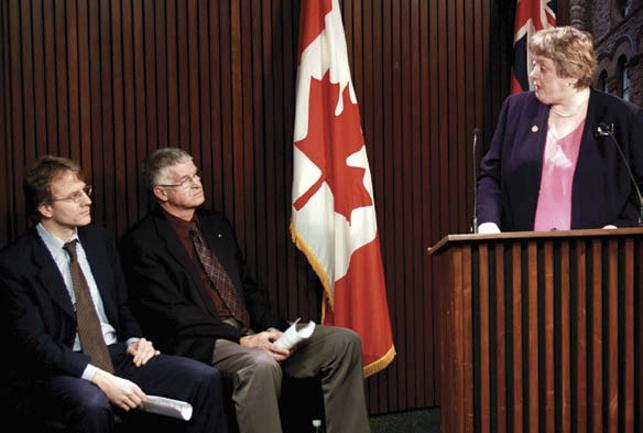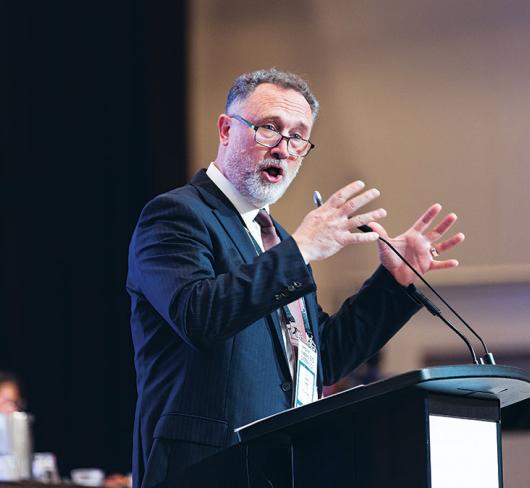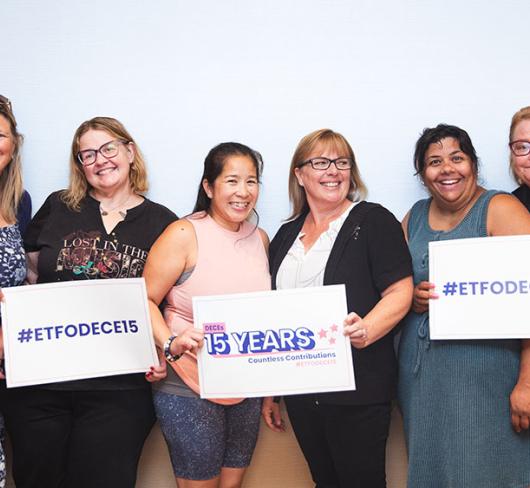
ETFO Celebrates 10 Years of Success: Ten Years of Collective Bargaining (Collective Bargaining)
In 1998, delegates to the first ETFO annual meeting unanimously passed the following motion: Thatthe Elementary Teachers’ Federation of Ontario work to restore free and full collective bargainingrights to teachers and education workers. This motion speaks volumes about the context in which this new organization was formed. ETFO was born during the Common Sense Revolution – the slogan of Mike Harris’s Conservative government – and as with all revolutions, there were lasting effects. We should never forget, however, that revolutions also result in unintended consequences. By denigrating educators, eroding their rights and ultimately forcing them onto the streets in a province-wide, two-week political protest in 1997, the Harris government inadvertently created its own worst nightmare. At that same annual meeting, delegates also passed a motion that “ETFO work to defeat the Harris Government in the next provincial election.” ETFO’s history falls neatly into two very different eras: the Tory years and the Liberal ones. In public sector negotiations, the nature of the government of the day, while not the only factor that influences the course of collective bargaining, is of course particularly important. The Tory era: years of turmoil In that first year ETFO local negotiators were working with three historically unprecedented challenges:
- The forced amalgamation of school boards created an artificial calendar for bargaining and, more importantly, gave boards an excuse to strip collective agreements by attempting to level down to the lowest common denominator.
- Bill 160, the Harris government’s Education Quality Improvement Act, changed the bargaining framework with intrusive incursions into teachers’ working conditions and professional development.
- A dysfunctional new funding formula and the removal of local school boards’ ability to levy taxes tied the entire system up in knots.
- It is truly amazing that collective agreements were reached at all, let alone that the much-anticipated rout never materialized. Some of those early agreements did contain strips, but others included provisions that were groundbreaking at the time, and that 10 years later have become entrenched. Waterloo teachers made inroads on supervision; Ottawa- Carleton teachers won 200 minutes of preparation time; numerous locals forced their boards to recognize the voluntary nature of extracurricular activities.
Achieving these provisions took more than just hard bargaining, however; it took teacher strikes, specifically in Simcoe County, Waterloo Region, and York Region. The York Region District School Board also locked out its teaching staff. This pattern of strong action in defence of working and learning conditions would continue. In 2000, Hamilton-Wentworth teachers were legislated back to work following a one-day strike and a 16-day lockout. That same school year, York Region and Toronto teachers engaged in a work-to-rule job action while Keewatin-Patricia and Lambton-Kent teachers worked to rule, withdrew their teaching services, and were locked out. The following school year, there were two work-to-rule job actions by teachers. In Renfrew County, three ETFO bargaining units – educational assistants, school support counsellors, and occasional teachers – went on strike simultaneously. The next school year, 2002-2003, nearly a third of ETFO teacher bargaining units engaged in work-to-rule actions. The Liberal era We could create a Hollywood ending by suggesting that job action was no longer necessary once the Liberals were elected in October 2003, but it would be fiction. There was an eventual impact on collective bargaining, but ETFO members are employed by school boards, not the Ministry of Education. Yes, education funding now comes exclusively from the province, but it is the boards that are the employers, pass budgets, formulate policy, allocate resources, hire school administrators and supervisory officers, and shape the day-to-day working lives of educators. The skill level of Ontario’s public school boards in the complex business of labour relations varies widely. The numerous legislated changes to the duration of collective agreements have complicated ETFO’s bargaining history. In 1997, Bill 160 dictated both a start date and a term limit for all teacher and occasional teacher collective agreements. The infamous Stability andExcellence in Education Act of June 2001, which created compulsory teacher recertification, had buried within it a tiny section mandating a common expiry date of August 2004 for all teacher and occasional teacher collective agreements. It further stipulated that all subsequent agreements must run for three years. After they were elected in 2003, the Liberals repealed the recertification process and changed, yet again, the term of collective agreements, which may now run for either two years or four. Since 2003 there has only been one ETFO full withdrawal of services strike – that of Near North occasional teachers in 2006. There have, however, been widespread work-to-rule job actions. Negotiating the first provincial framework At the 2004 Annual Meeting, delegates supported concerted action toward achieving 200 minutes of preparation time for teachers, and occasional teacher timetables that reflected those of the teachers they were replacing. Campaign 200 and There IsNo Substitute for a Substitute Teacher were the two most ambitious collective bargaining campaigns ETFO had ever undertaken. In addition to mounting a massive public relations effort, ETFO placed all locals in “provincial takeover” simultaneously – the first time this had ever happened. While the provincial office has always been involved in local negotiations, provincial takeover is a mechanism for providing significantly enhanced financial and staff resources to locals in bargaining. In December 2004, Education Minister Gerard Kennedy initiated provincial talks involving the ministry, the Ontario Public School Boards’ Association (OPSBA), and ETFO. Teacher locals took strike votes in the winter of 2005; these were followed by province-wide work-to- rule actions. The four-year framework agreement signed in April 2005 included phased-in salary increases, a cap on supervision time, and 200 minutes of preparation time. Local collective agreements for teachers were concluded within the next three months. In the following year, occasional teacher agreements that included provisions for timetabling were negotiated in all locals. This too, required some work-to-rule actions, as well as the Near North strike. Salary gains for occasional teachers were particularly dramatic this round, with roughly one third of locals achieving increases in excess of 18 per cent. Four-year agreements have meant a slowdown in bargaining-related activity, but no more than that. Enforcing these collective agreements has been an enormous challenge for locals. There has been the added layer of the Provincial Stability Commission, established under the four-year framework to deal specifically with supervision issues. We now have a government that has invested in such vital areas as primary class size, professional learning, and physical plant upgrades. Yet there is a long way to go before we have an elementary education system that is truly all that it can be. That requires the foresight to recognize that investing in elementary education is every bit as important as investing in secondary education. This past winter, ETFO again participated in provincial discussions with government officials and representatives from the OPSBA in an effort to reach agreement on key bargaining issues. These talks were not successful. The government was not willing to work with elementary educators to close the funding gap and to phase in much-needed improvements to the system. How collective bargaining has changed There have been many changes over these past 10 years, but we can single out five in particular: the role of stewards, the shift in board management philosophy, the altered role of school administrators, the improvements in collective agreements, and the increasing resolve among members. Vibrant stewards’ networks have replaced the looser system of school-level contacts that ETFO’s two predecessor organizations had. This achievement is due to much hard work and dedication on the part of stewards and local executive members. Stewards are the backbone of any union; ETFO’s stewards cannot possibly be thanked enough for all the work that they do. ETFO’s success in the current round of negotiations hinges on their solidarity and support. School board management practices have undergone a significant shift. Even before the teaching profession was brought under the purview of the Labour Relations Act, boards had the legal authority to impose lockouts, yet they did not exercise it in public elementary schools. Prior to 1998, there were no lockouts in the public elementary panel. Between 1998 and 2001, there were four. The 2001 collective bargaining report to the annual meeting states: “There were approximately 52,300 ‘person days’ lost to job action this school year – some 5% of which were caused by strikes, and 95% caused by lockouts.” Today, school boards use tactics they would not have dreamed of years ago. They have every legal right to impose lockouts, of course, but it does signal a change in philosophy. Boards have also become much more willing to spend large sums of public money in pursuing petty grievances that could be resolved more easily at an earlier stage. The role of principals was forever altered when Bill 160 removed them from teacher bargaining units. This change transformed the face of labour relations in the education sector. The 2000 collective bargaining report noted that “while Ontario is blessed with a great many school principals who are decent individuals capable of correctly interpreting a collective agreement, members sometimes have to deal with the other kind.” The principal’s function changed from that of a teacher-leader to that of a manager, and the transition has not been smooth. Having managers in schools is not a bad thing; when they are given the time and resources to do their jobs properly, it can make the rest of the staff ’s jobs that much easier. But it definitely alters the workplace dynamic. The improvement in the quality and level of sophistication of ETFO collective agreementshas been dramatic. Ten years ago, many working conditions and rights that we view as fundamental today were barely addressed in the agreements. Defined parameters for instructional, preparation, and supervision time, health and safety clauses such as protection against Fifth disease, greatly improved pregnancy and parental leave provisions, improved protections around personnel files and disciplinary procedures – the list is long. Improvements in collective agreements are never given; they are won, at a cost. Or, in the words of the 1999 report to the annual meeting, “The past year has proven time and again that oldest of negotiator’s maxims: at the end of the day, bargaining is a question of political will.” The increasing resolve of ETFO members that has resulted from being “forged in the fire” over the past decade is the final and most important change. Good collective agreements do not happen unless local members support the bargaining process. In 10 years of very hard bargaining, ETFO members have repeatedly demonstrated their commitment to improviing their own working conditions and their students’ learning conditions. In bargaining, the outcome hinges far less on the discussions taking place at the negotiating table than on those occurring in the staffroom. This school year, those staffroom discussions will matter like never before.

